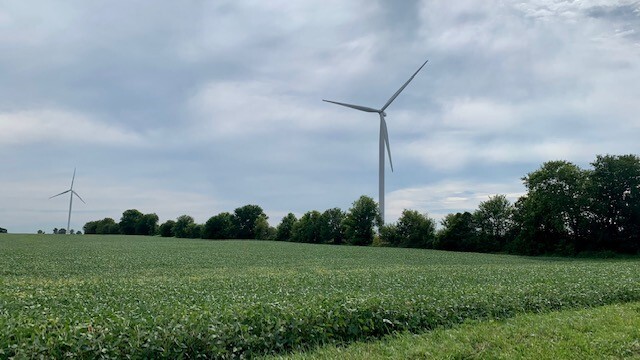CHAMPAIGN – Donald Trump sparked a trade war during his first administration when he imposed tariffs on China and other countries.
Many US business sectors felt the impact — including Illinois agriculture. And for his second term, Trump proposed various tariffs on the campaign trail and after his election, including a 60% tariff increase on Chinese imports and an additional 25% tariff on imports from Canada and Mexico.
JC Reitmeier says Trump’s past tariffs have not had a direct impact on him. Reitmeier is a 4th-generation corn and soybean farmer in Champaign County’s Stanton Township, which he describes as a heavily Republican area.
Reitmeier just finished a term as co-president of the Champaign County Active Senior Republicans. The group, which socializes and hosts guest speakers at its monthly meetings, celebrated Donald Trump’s election victory at a recent gathering at the Champaign Public Library.
Republicans lost all of their contested races in Champaign County government in 2024. But the Active Senior Republicans were happy about Trump’s imminent return to the White House.
Reitmeier said the new Trump administration will face a big challenge in helping farmers, notably when trying to bring up prices for his crops.
“A lot of the big buyers have gone to South America and other countries to get their corn and soybeans and we’re kind of in the dust again,” said Reitmeier. “We’re just going to have to get our exports built back up.”
How a US tariff on Chinese imports affected American soybean exports
Illinois was the number one state in the nation for producing soybeans in 2023, and number two for corn, according to annual figures from the U.S. Department of Agriculture.
A large share of those crops are sold to other countries, notably China, which is the largest buyer of US soybeans, and third largest buyer of its corn.
But when the Trump administration imposed tariffs on Chinese goods in 2018, China retaliated with tariffs on U-S crop exports, especially soybeans.
Joe Janzen is an assistant professor Agricultural and Consumer Economics agricultural economist at the University of Illinois.
He says the tariffs caused Chinese buyers to look elsewhere.
How the US and Brazil compete for the global soybean market
“So what we saw at that time, was prices for soybeans in the United States went down,” said Janzen. “Prices for soybeans in other parts of the world, and particularly Brazil, went up.”
Brazil surpassed the US in soybean exports to China about a decade ago, according to U of I ag economics researcher Joana Colussi. She says the US-China trade war only widened the gap.
And if new tariffs are imposed, and China continues to retaliate, Colussi says Brazil is ready to take even more of the US market share.
“If China would like to buy more soybeans from South America to replace the amount of soybeans that they would buy here in the US, given the numbers so far, or given the situation until now, South America will be able to match this demand,” said Colussi.
The tariff debate continues
While tariffs seem to have resulted in gains for some US industries, like steel and aluminum, a review by the Tax Foundation, a generally pro-tax cut think tank, concluded that tariffs under President’s Trump and Joe Biden have had a net negative impact on the U-S economy.
But Trump has repeatedly voiced his belief that “tariffs will make our country rich” and would be an effective tactic for working out bilateral trade deals with other countries.
“I always said, to me, tariffs, the most beautiful word in the dictionary,” said Trump at a December 16, 2024 news conference. “You go back and you look at the 1890s, 1880s, McKinley, and you take a look at tariffs, that was when we were at our proportionately, the richest.”
“I again, respectfully disagree with the incoming president,” is how a spokesman for the Illinois Farm Bureau reacts to Trump’s viewpoint.
Ryan Whitehouse is the Illinois Farm Bureau’s Director of National Legislation. He and other farm groups such as the American Soybean Association and the National Corn Growers Association say tariffs on imported goods will hurt everyday Americans.
“When you add cost to something, someone’s got to pay for that,” said Whitehouse, “and whether that be solely by the consumer or even a partial share with the producer and the manufacturer and the consumer, the consumer’s still paying more.”
Despite such arguments, farmer JC Reitmeier is still looking forward to a second term for Donald Trump. But he’s not enthusiastic about Trump’s promise to impose new tariffs.
“I’m not sure that tariffs are going to do it,” says Reitmeier. “Tariffs are a bad thing in my point of view.”
Reitmeier thinks the talk about tariffs is mostly hype — and he hopes it stays that way, at least when it comes to agricultural commodities and the crops he grows.

